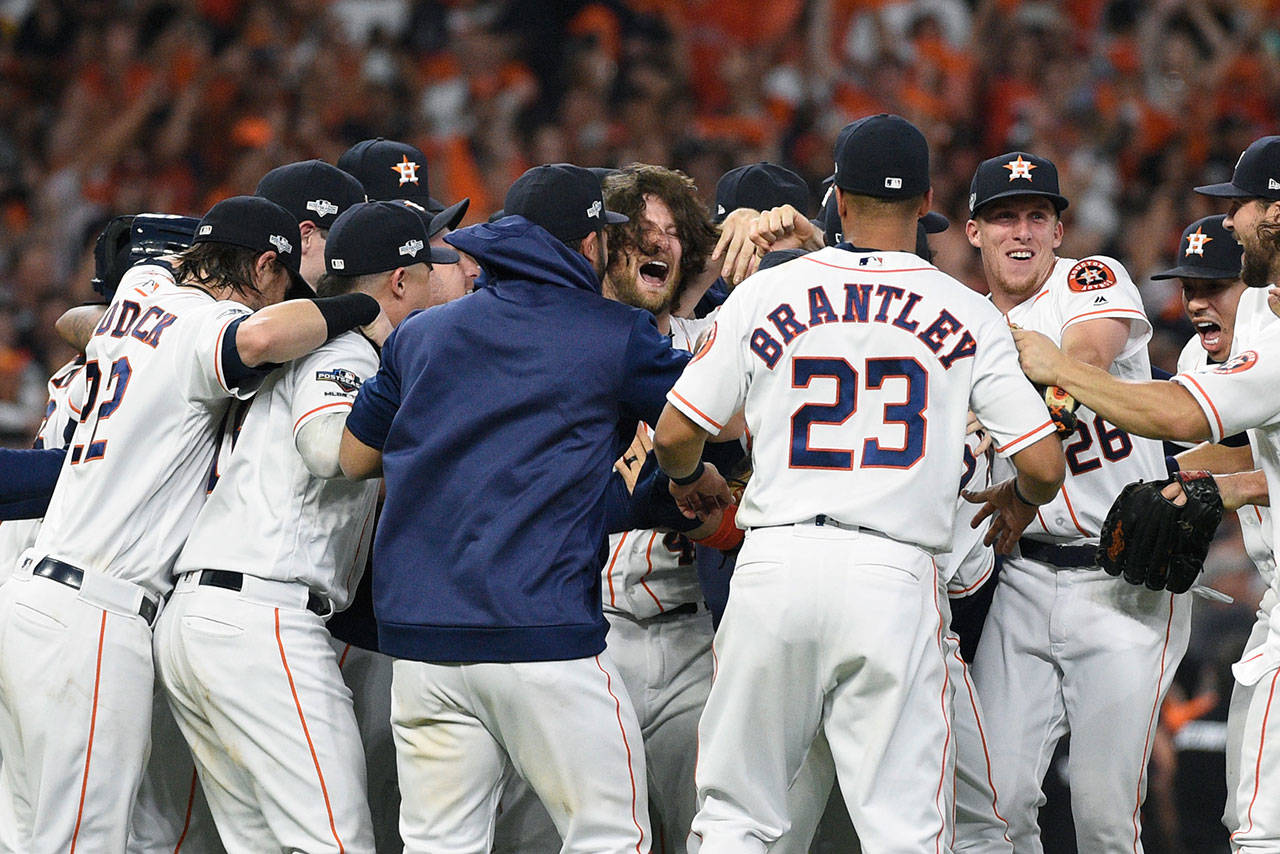Thursday night, as I watched the Houston Astros jumping up and down on the mound at Minute Maid Park and mobbing pitcher Gerrit Cole after defeating the Tampa Bay Rays 6-1 to advance to their third straight American League Championship Series, I found myself pondering two questions:
Can the Seattle Mariners follow in the Astros’ footsteps? And can they do it while taking a shortcut?
The Astros have become baseball’s gold standard. Three straight 100-win seasons. A roster littered with All-Star-caliber performers. One World Series championship in 2017 and favored to claim another this year. It’s what all major-league teams strive for, including the Mariners.
I may be a Seattle guy, but I have to admit to having a soft spot for the Astros. Maybe it’s because I used the Astros when playing RBI Baseball on Nintendo as a kid. Or perhaps it’s because I was a short, speedy middle infielder in my youth baseball days and therefore feel kinship with Jose Altuve.
But I think the biggest reason why I have admiration for the Astros is because they had a plan and they committed to it fully. And as I watch Houston march toward another World Series appearance I wonder whether the Mariners, who are trying to emulate their American League West rival’s approach, have the same kind of guts to stick to the plan.
The Astros being where they are now, as they open the ALCS on Saturday night against the New York Yankees, didn’t just happen out of thin air. It’s the product of a long-term plan that required undergoing a large amount of pain before the plan paid off.
Prior to the 2011 season the Astros were stuck in no-man’s land, five straight seasons without playoff baseball and trapped in the limbo of mediocre irrelevance. That’s when Houston decided to blow it all up. The Astros sold off every asset with any value, and by 2013 their best players were guys named Jason Castro, Chris Carter and Matt Dominguez. The team’s 2013 payroll was $35 million, which was half of the 27th-highest total and 15% of the league-high Los Angeles Dodgers. Houston suffered through three straight 100-loss seasons from 2011-13, seeing attendance plummet from 2.33 million in 2010 to 1.61 million in 2012.
But all that suffering allowed the Astros to accumulate assets, from prospects to high draft picks, and the result was the acquisitions of the likes of George Springer, Carlos Correa and Alex Bregman, who form the core of a championship-caliber team.
This was the path Mariners general manager Jerry Dipoto set Seattle on when, before the season began, he announced 2019 as a “step-back” season. In many ways the Mariners’ 2019 resembled the Astros’ 2011. Seattle traded away high-priced veterans and acquired young talent and payroll flexibility in return, just as Houston did. Both teams saw a dramatic drops in the standings (21 games for the Mariners, 20 games for the Astros) and a corresponding dip in attendance. Credit needs to be given to Seattle’s ownership for carrying through with 2019, knowing how fickle Seattle fans can be about showing up for losing teams.
But now the Mariners have reached a fork in the road. The Astros took their rebuild even further over the course of two more seasons, bottoming out with 111 losses in 2013 before beginning their ascent to the top of the baseball world. Seattle, on the other hand, seems to believe the worst part of the process is over. The Mariners’ publicly-stated timeline has always been to survive 2019, see progress in 2020 and reach contention in 2021. Seattle seems to think it can achieve Houston’s results without suffering though the Astros’ pain.
This is a dangerous assumption to make. It’s not like the Mariners are the only organization that took notice of what Houston accomplished and is trying to follow the path. How has that worked out for the San Diego Padres? Or the Chicago White Sox? Neither of which went full Astros. Does the evidence suggest teams need to hit rock bottom the way Houston did in the rebuilding process in order to become a true juggernaut?
And even if the Mariners succeed in cutting the corners, they face an obstacle the Astros never faced: the Astros. When Houston rose to prominence, there was no king of the hill in the AL West that needed to be dethroned. If Seattle succeeds in reaching contention level in 2021, the Astros are still going to be there waiting for them. Sure, some of those core players will have reached the decline phase of their careers, and a few may have left for bigger free-agent contracts. But Bregman and Correa will still be in their primes, Yordan Alvarez and Kyle Tucker will be hitting their strides (if they haven’t already), and no doubt Houston will be able to come up with a trade for another veteran ace pitcher. This is the team the Mariners will have to topple if it wants to assure an end to its playoff drought, and bear in mind Seattle went 1-18 against Houston this season.
So yes, I applaud the Mariners for committing to the rebuilding process. It was long overdue, and it’s off to an encouraging start. But I want to raise the warning flag about getting sidetracked by shortcuts. Remember, Rome wasn’t built in a day, and neither were these Houston Astros.
Follow Nick Patterson on Twitter at @NickHPatterson.
Talk to us
> Give us your news tips.
> Send us a letter to the editor.
> More Herald contact information.

























